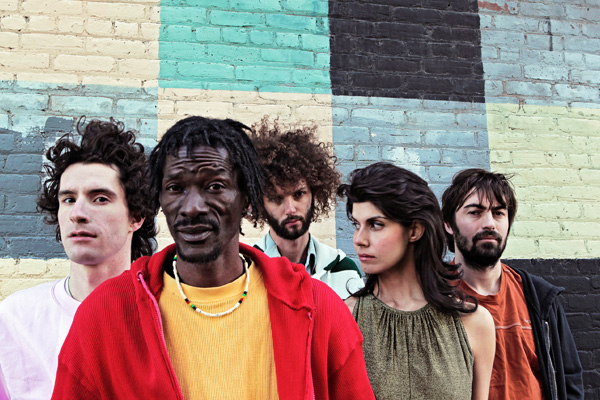They are the history lesson untaught, the newsflash unpublished, and ancient traditions unearthed on the cusp of contemporary Brooklyn electro-dance wed with a coercing Sierra Leone in the bubu six-piece, Janka Nabay & The Bubu Gang (Janka Nabay, vocals; Boshra AlSaadi, vocals (Saadi); Jonathan Leland, drums (Skeletons); Michael Gallope, keyboards (Skeletons/Starring); Nico Testa, guitar; Pat Noecker, bass (These Are Powers)). Together Janka Nabay and the band are storming art and culture reality, bouncing rays of African roots through carefully composed sounds which harken Nabay’s journey through civil war and the art of survival.
[mp3j track=”Feba.mp3″]
What feels like an effortless education in instrumentation and beat culture, listeners learn not only the classical elements of bubu, but also of Africa traditions and the African American culture. Janka Nabay & The Bubu Gang elevate the pulse of universal groove through modern technology over the raw, disparate layers of native bubu music. Their latest video, filmed at the Getty Museam in Los Angeles, takes a feel good bite outta the life and love embedded in musical narrative of Janka Nabay today.
A brief interview with Janka Nabay reveals pieces of his history, the unorthodox making of his band, and the jewelry behind not just his decorative style, but also his arrival to the US. Bob to his story alongside some music du jour with their latest work, Feba and Somebody, off the band’s debut album, En Yay Sah (Luaka Bop). Catch their upcoming lives show: 11/3 Grand Rapids, MI @ Ladies Literary Clu.
TL: In effort to restore the roots of African music, particularly, Bubu, how do you approach the traditions of these sounds and carve it into the sounds of today?
JN: Well it’s’ s not just by me. I contribute the traditional parts of our music and then my whole band and I come together to make this bubu music right. And they have different talents from me, and bring something else to the table. I tell them about traditional bubu and teach them how it goes, and then everyone adds their own flavor and then all together we just explode!
TL: How did you arrive in the US, from Sierra Leone, and what has been your driving force in pursuing music?
JN: Here was war in my country and in 2001 I had a friend call me and say I want to help you come to the US. Because at that time the war was finished, but all the hatred was still around. If you were popular or well-known in the country like a famous soccer player or musician the rebels wanted to kill you. I had no money, there were no banks even open at the time. I came to America and lived a good 6-8 years thinking of what to do, where to find the music, working at Crown Fried Chicken, Car washes etc.
Wills Glasspiegel found me and took me from crown fried chicken to nyc. The first time i performed was at Babylon. The first girl I sat with that night is in the band now, our waiter became our drummer, andIt happened immediately. The day after I played, we all got together to practice and the band was formed. After like 2 weeks, we met our guitarist. Ah it’s so great. I want to introduce the world to this music.
TL: As you deliver a rawness and natural beat, do find it challenging and/or motivational to weld ancient sound with contemporary styles, and what other musicians do you see fusing together primitive/historical music with the layers of contemporary sound today?
JN: I don’t find it challenging to mix the two styles because Bubu is naturally a mixture of so many things. It has calypso and rumba and reggae in it, but it’s still like no other music. It is it’s own but still universal. I’m 18 years deep into this music. It may take some time but I think it will reach everyone in the world
TL: What/who do you sing to when you deliver your music and propel the art of sound into your audience?
JN: Everybody, – That was actually the title of my first Bubu song. Ah, I need to release it. But the music I sing is directed towards everyone. I want it to touch everyone.
TL: How has being in New York most influenced your work, and where do you see yourself in the next 5 years with music?
JN: Being in NYC on and off… it’s so cool. But really, I don’t want to be in NYC for extended amounts of time. I feel like it might take my talent. There are so many creative things to do here and so many creative people that it might distract me from what I’m focusing on. I don’t’ want to split my talent in two i want to spend all my time on music. But I also don’t want to live too far from New york. The next five years I want to have shared as much music as possible but I also want to incorporate school and institution in what I share. I like to work with kids, so I;d like to help in schools, spread knowledge. I want my name to stay and live on and be in books someday. Eventually I want someone to pick up a pen and write about me.
TL: Are there particular messages you feel more strongly about delivering with your material?
JN: Yes, a lot of my messages go out to Sierra Leoneans, I like to sing about things people love to hate
I’d like them to listen to all of my messages. Whether I talk about God, the household, or whatever, I don’t have a song that isn’t based on educating people. One thing I’d like to see is African and African Americans together as one. I started a program to better educate the other. There is a lot of hate and confusion between the two. Once I was wearing an African flag and an eleven year old African American boy comes up to me and asks me if I’m Jamaican and I said “No, I’m African” and he says, “Are you a regular African?” he seemed confused by me. I wanted to indoctrinate him, and get the right idea in his head.
TL: You’ve collaborated with a seasoned lineup of talented artists over the course of building your career, any particularly artists you look forward to working with in the future or would like to work with?
JN: Yes, snoop dogg. I like him so much, I like his flow. I got something for him to do. I’m not a hip hop guy but I’d like to do something with Kanye West too. Snoop fits with the bubu music, Kanye West i want him because he talked about Sierra Leone in his music. The first time I saw the video for “Diamonds From Sierra Leone” I was like “wow.” He had these are Sierra Leonean looking children in it, thought it was so great he could educate the mainstream culture on my country.
TL: Where throughout culture and society today do you feel music holds the most power to influence (film, streets, media, live concerts, venues, backyards, in the car, working out…)
JN: I think it’s at festivals. A lot of people go to festivals that might not go to bars and clubs. I think every type of person can go.
TL: How approach design and selling your jewelry and what does this represent for you?
JN: I’ve been making jewelry since I lived in Africa. I started playing this music, and it was so hard to survive on it alone so I decided to make and sell jewelry. I became an expert at it, sold to traders, taught the local children how to make it. It did the same thing to survive when I came to America. i started selling them to supplement music and now it’s sort of my business. It’s (the jewelry) just like a local metal necklace. It’s culture, my culture. There’s nothing on it, no protection, just represents one’s culture and loving it.
More at www.jankanabay.com






